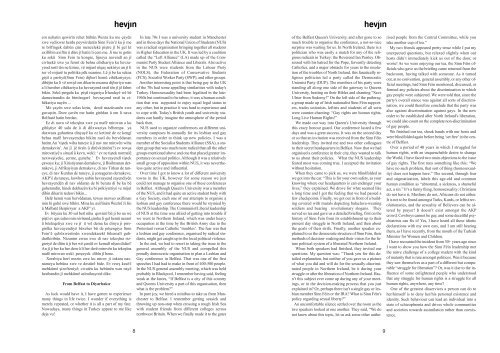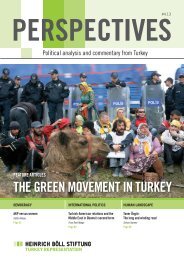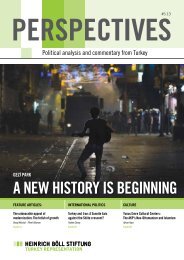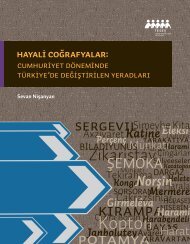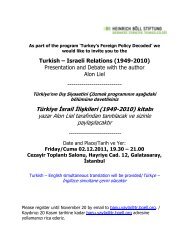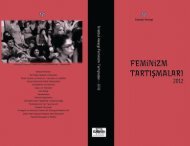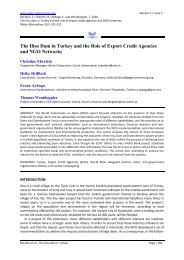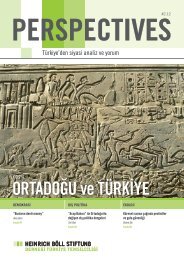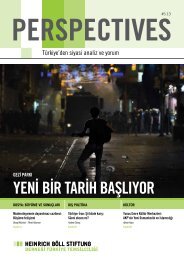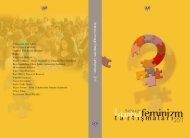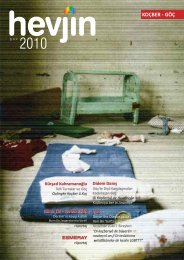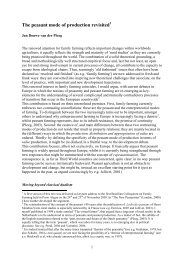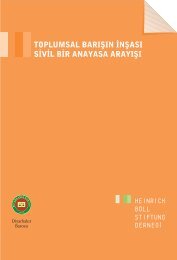PDF versiyonuna
PDF versiyonuna
PDF versiyonuna
You also want an ePaper? Increase the reach of your titles
YUMPU automatically turns print PDFs into web optimized ePapers that Google loves.
em nehatin qewirîn rehet bûbûn.Wexta ku me çayên<br />
xwe vedixwar herdu peywirdarên Sinn Fein’ê ku ji me<br />
re brîfîngek dabûn çûn menzelekê piştre jî bi gel kî<br />
axiftibin axiftin û dûre jî hatin li cem me. Ji me re gotin<br />
ku sekû Sinn Fein tu kongre, lijneya navendî an jî<br />
civînekê xwe ya fermî de behsa cihêkariya ku hevzayend<br />
rastî tên ne kirine, vê mijarê nîqaş nekiriye an jî li<br />
ser vê mijarê tu politika pêk neanine. Lê ji bo ku sekna<br />
giştî a partiyê(Sinn Fein) dijberî hemû cihêkariyaye;<br />
dibêjin ku li vê rewşê em dikarin encama dijberiya wan<br />
a li hember cihêkariya ku hevzayend rastî tên jî jê fahm<br />
bikin. Sekû pergala ku piştî rizgariya Îrlandayê wê bê<br />
damezirandin de bimîsogerî hevzayend rastî tu cihêkariya<br />
nayên ...<br />
Me çayên xwe xelas kirin, destê mazûvanên xwe<br />
guvaştin. Dure çavên me hatin girêdan û em li nava<br />
Belfastê hatin berdan.<br />
Ez di nava vê tekoşîna xwe ya mafê mirovan a ku<br />
gihîştiye 40 sala de û di dilxwaziya bêhempa ya<br />
daxwaza guhartina dinyayê ku ez ketimê de ez kengî<br />
behsa mafê hevzayendan bikim rastî du bervêdanan<br />
hatim.An ’tiştek wiha tuneye û ji nav me mirovên wiha<br />
dernakevin’. An jî jê tirsîn û dirûvkirinên(?) ev rewşa<br />
mirovatiyê a siruştî û kevn, wekî: ‘ ev ne tiştek normalê<br />
nexweşiyeke, şerme, gunehe.’ Ev hevzayendî tiştek<br />
çawaye ku; ji Xiristiyanan dernakeve, ji Bisilmanan dernakeve,<br />
ji Afrîkayiyan dernakeve, di nav Tirkan de tuneye,<br />
di nav Kurdan de tuneye, ji şoreşgeran dernakeve,<br />
AKP’ê da tuneye, kowboy nabin hevzayend zayendiyên<br />
hevzayendên di nav oldaran de bi berata di be ku bê<br />
guherandin, hinek dekbazên ku bi psîkiyatriyê ve mijul<br />
dibin dikarin tedawi bikin...<br />
Belê hemû wan bervêdanan, tewşo mewşo axiftinan<br />
min bi guhê xwe bîhîst. Mina ku axiftinên Wezîrê Ji Jin<br />
û Malbatê Berpirsyar a AKP’ yî.<br />
Ev bûyera ku 30 sal berî niha qewimî bû ji bo na we<br />
piştî ev qas salan min nivîsand,çimku li gel hemû nezanî<br />
û bêeleqetiya xwe ve jî û wê dema ku dinya ji pirsgirêka<br />
hevzayendiyê bêxeber bû de pêşengiya Sinn<br />
Fein’ê qebûxwestinên xwendekarekî bikemalî guhdarîkiribûn.<br />
Nizanim ewan xwe di nav tekoşîna rizgariyê<br />
de dîtin û ji ber wê çendê ev kemalî nîşan didan?<br />
An jî ji ber ku her dem û li her derê mirovên ku tekoşîna<br />
mafê mirovan wekî perçeyek dibîn jî hene.<br />
Xerabiya herî mezin ewe ku mirov ji inkara nasnameya<br />
hebûna xwe ve destûrê bide. Ev rewş kesê/î<br />
mehkûmê şizofreniyê; civatên ku hebûnên wan nayê<br />
hesibandin jî mehkûmê asîmilasyonê dike.<br />
From Belfast to Diyarbakır<br />
As luck would have it, I have gotten to experience<br />
many things in life twice. I wonder if everything is<br />
merely repeated, or whether it is all a part of my fate.<br />
Nowadays, many things in Turkey appear to me like<br />
deja vu!<br />
In late 70s I was a university student in Manchester<br />
and in those days the National Union of Students (NUS)<br />
was a radical organisation bringing together all students<br />
in Higher Education in the UK. It was led by a coalition<br />
called the “Left Alliance” (LA) made up of the Communist<br />
Party Student Alliance and Liberals. Also active<br />
in the NUS were students from the Labour Party<br />
(NOLS), the Federation of Conservative Students<br />
(FCS), Socialist Worker Party (SWP), and other groups.<br />
Another interesting point is that being gay in the UK<br />
of the 70s had some appalling similarities with today's<br />
Turkey. Homosexuality had been legalised in the late-<br />
1960s but continued to be taboo; it was a human condition<br />
that was supposed to enjoy equal legal status to<br />
any other, but in practice it was hard to experience and<br />
to cope with. Today's British youth and university students<br />
can hardly imagine the atmosphere of the period<br />
back then.<br />
NUS used to organize conferences on different university<br />
campuses bi-annually for its lesbian and gay<br />
members in order to think up new policies. I was a<br />
member of the Socialist Students Alliance (SSA), a student<br />
group that was much more radical than all the other<br />
groups mentioned above and one that placed greater importance<br />
on sexual politics. Although it was a relatively<br />
small group of opposition within NUS, it was nevertheless<br />
quite active and influential.<br />
Over time I got to know a lot of different university<br />
towns in the UK, however for some reason we just<br />
could not manage to organise one of these conferences<br />
in Belfast. Although Queen's University was a member<br />
of the NUS, and it had quite an active student body with<br />
a Gay Society, each one of our attempts to organise a<br />
lesbian and gay conference there would be stymied by<br />
the NUS leadership. The Communist/Liberal leadership<br />
of NUS at the time was afraid of getting into trouble if<br />
we went to Northern Ireland, which was under heavy<br />
occupation at the time by the British Army due to the<br />
Protestant versus Catholic ‘troubles’. The fear was that<br />
a lesbian and gay conference, organised by radical students,<br />
might get caught up in the local political violence.<br />
In the end, we had to resort to taking the issue to the<br />
general assembly of the NUS and compelled this<br />
proudly democratic organisation to plan a Lesbian and<br />
Gay conference in Belfast. That was one of the first<br />
speeches I had had to make in front of 400-500 people.<br />
In the NUS general assembly meeting, which was held<br />
probably in Blackpool, I remember having said, feeling<br />
weak at the knees, “If Belfast is a city of this country<br />
and Queens University a part of this organisation, then<br />
what is the problem?”<br />
In pure joy, we hired a minibus to take us from Manchester<br />
to Belfast. I remember getting seasick and<br />
throwing up non-stop when crossing a rough Irish Sea<br />
with student friends from different colleges across<br />
northwest Britain. When we finally made it to the gates<br />
of the Belfast Queen's University, and after gone to so<br />
much trouble to organise the conference, a not-so-nice<br />
surprise was waiting for us. In North Ireland, there is a<br />
politician who was easily a match for any of the religious<br />
radicals in Turkey: the Reverend Ian Paisley. Obsessed<br />
with his hatred for the Pope, fervently detesting<br />
Catholics, and a major obstacle for years to the resolution<br />
of the troubles of North Ireland, this fanatically religious<br />
politician led a party called the Democratic<br />
Unionist Party (DUP). The members of his party were<br />
standing all along one side of the gateway to Queens<br />
University, beating on their Bibles and chanting “Save<br />
Ulster from Sodomy!” On the left side of the pathway,<br />
a group made up of Irish nationalist Sinn Féin supporters,<br />
trades unionists, leftists and students of all sorts<br />
were counter-chanting: “Gay rights are human rights,<br />
Long Live Human Rights!”<br />
We made our way into Queen's University through<br />
this crazy honour guard. Our conference lasted a few<br />
days and was a great success. It was on the second day<br />
or so that an invitation was received from the Sinn Féin<br />
leadership. They invited me and two other colleagues<br />
to their secret headquarters in Belfast. Now that we had<br />
organised a conference in their city, they wanted to talk<br />
to us about their policies. What the NUS leadership<br />
feared most was coming true. I accepted the invitation<br />
without hesitation.<br />
When they came to pick us, we were blindfolded as<br />
we got into the car. “This is for your own safety, as your<br />
knowing where our headquarters is can endanger your<br />
lives,” they explained. We drove for what seemed like<br />
a long time and I got the feeling that we had passed a<br />
few checkpoints. Finally, we got out in front of a building<br />
covered with murals depicting balaclava-wearing<br />
soldiers and bearing revolutionary slogans. They<br />
served us tea and gave us a detailed briefing, first on the<br />
history of Sinn Fein from its establishment up to their<br />
present day struggle in North Ireland, and then about<br />
the goals of their strife. Finally, another speaker explained<br />
to us the democratic structure of Sinn Fein, their<br />
methods of decision- making and their vision for the future<br />
political system of a liberated Northern Ireland.<br />
When both speakers had finished, they invited our<br />
questions. My question was: “Thank you for this detailed<br />
explanation, but neither of you gave us a picture<br />
of what you did and will do for the sexually-discriminated<br />
people in Northern Ireland, be it during your<br />
struggle or after the liberation of Northern Ireland. Hasn’t<br />
this subject ever come up during any of your meetings,<br />
or in the decision-making process that you just<br />
explained in? Or, perhaps there isn't a single gay or lesbian<br />
member Sinn Féin or the IRA? What is Sinn Féin's<br />
policy regarding sexual liberty?”<br />
An uncomfortable silence settled over the room as the<br />
two speakers looked at one another. They said, “We do<br />
not know about this topic, let us ask some other authorised<br />
people from the Central Committee, while you<br />
take another cup of tea.”<br />
My two friends appeared pretty tense while I put my<br />
unexpected questions, but relaxed slightly when our<br />
hosts didn´t immediately kick us out of the door, or<br />
worse! As we were enjoying our tea, the Sinn Féin officials<br />
who gave us the briefing came returned from the<br />
backroom, having talked with someone. As it turned<br />
out, at no convention, general assembly, or any other official<br />
meetings, had Sinn Féin mentioned, discussed, or<br />
formed any policies about the discrimination to which<br />
gay people were subjected. We were told that, since the<br />
party's overall stance was against all sorts of discrimination,<br />
we could therefore conclude that the party was<br />
also against discrimination against gays. In the new<br />
order to be established after North Ireland's liberation,<br />
we could also count on the complete non-discrimination<br />
of gay people.<br />
We finished our tea, shook hands with our hosts and<br />
were blindfolded again before being ‘set free’ in the centre<br />
of Belfast.<br />
Over a period of 40 years in which I struggled for<br />
human rights, with an unquenchable desire to change<br />
the World, I have faced two main objections to the issue<br />
of gay rights. The first runs something like this: “We<br />
have no such problem, that sort of thing (homosexuality)<br />
does not happen here.” The second, through fear<br />
and stigmatization, labels this age-old and common<br />
human condition as “abnormal, a sickness, a shameful<br />
act, a sin.” It’s a funny thing, homosexuality; Christians<br />
do not have it, Muslims do not, Africans do not either.<br />
It is not to be found amongst Turks, Kurds, or leftist revolutionaries,<br />
and the sexuality of Believers can be altered<br />
by prayer! It doesn’t exist amongst the AKP<br />
crowd. Cowboys cannot be gay, and some deceitful psychiatrists<br />
can fix it! Yes, I have heard all these idiotic<br />
declarations with my own ears, and I am still hearing<br />
them, as I have recently, from the mouth of the Turkish<br />
Minister for Women and Children.<br />
I have recounted the incident from 30+ years ago since<br />
I want to show you how the Sinn Féin leadership met<br />
the naïve challenge of a college student with the kind<br />
of maturity that is rare amongst politicos. Was it because<br />
they saw themselves as a part of a different but comparable<br />
“struggle for liberation”? Or, was it due to the influence<br />
of some enlightened people who understood<br />
that any struggle for human rights is a struggle for all<br />
human rights, anywhere, any time?<br />
One of the greatest disservices a person can do to<br />
her/himself is to deny her/his personal existence and<br />
identity. Such behaviour can lead an individual into a<br />
state of schizophrenia and drives whole communities<br />
and societies towards assimilation rather than coexistence.<br />
8<br />
9


